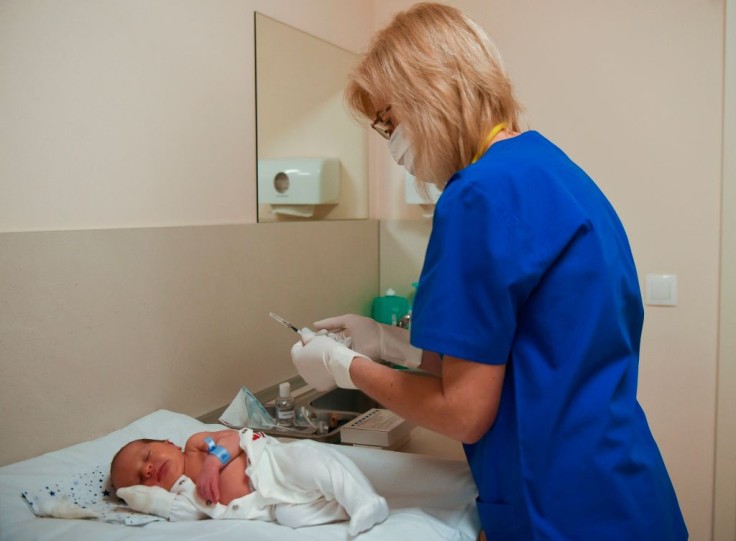
Children as young as six months can now have their COVID booster shots. The Food and Drug Administration (FDA) is hopeful that this update can push more parents to have their children vaccinated.
The FDA announced Thursday that they had amended the emergency use authorization of the updated bivalent COVID-19 boosters under Moderna and Pfizer-BioNTech for children between the ages of six months and four years old from only five years old and up last October, Pharmacy Times reported.
FDA Commissioner, Dr. Robert Califf, said that "More children now have the opportunity to update their protection against COVID-19 with a bivalent COVID-19 vaccine, and we encourage parents and caregivers of those eligible to consider doing so - especially as we head into the holidays and winter months where more time will be spent indoors.
Califf added that as "this virus has changed and immunity from previous COVID-19 vaccination wanes, the more people who keep up to date on COVID-19 vaccinations, the more benefit there will be for individuals, families and public health by helping prevent severe illnesses, hospitalizations, and deaths."
Parents are being encouraged to do initial vaccination and boosters
The updated COVID booster, which is targeting the BA.4 and BA.5 omicron subvariants and other newer strains of the virus, will be available starting next week. The new age group is the last they will authorize to become eligible for the new booster.
According to the Centers for Disease Control and Prevention, only less than 10 percent of children under five years old have been vaccinated, leaving a tiny pool of children eligible for the updated available boosters, ABC News reported.
Thus, FDA vaccine chief, Dr. Peter Marks, is hoping that parents of both vaccinated and unvaccinated children will be encouraged to get the boosters and the initial vaccination.
Dr. Marks said that 90 percent of parents who have yet to get their children vaccinated should consider doing the first series of shots already, reminding them that not vaccinating the kids at all puts them at higher risks for the worst possible outcomes of COVID-19, which seems to have no plans of leaving.
He added parents could be assured that their authorization for vaccination and boosters have "taken a great deal of care" in their review.
Read Also: CDC Data Shows Kids Ages 5 to 11 Are The Least Vaccinated Against COVID-19 in The United States
What parents need to know
FDA released the following list of important information for parents and caregivers to know before taking their children for initial vaccination or booster shots.
- Children aged six months to five who have already received the original or monovalent Moderna COVID-19 vaccine are now eligible to receive a single booster of the updated or bivalent Moderna COVID-19 Vaccine, provided that it has been two months after the completion of the primary series.
- Children aged six months to four who have not yet received their 3-dose primary series of the Pfizer-BioNTech COVID-19 vaccine or have not yet received the 3rd dose of their primary series will now receive the updated or bivalent Pfizer-BioNTech COVID-19 vaccine as their 3rd dose following the two doses from the original or monovalent Pfizer-BioNTech COVID-19 vaccine.
- On the other hand, children aged six months old to four who have already completed their 3-dose primary series with the original or monovalent Pfizer-BioNTech COVID-19 vaccine will not be eligible for the updated bivalent booster dose at this time as they are expected to still have protection against serious outcomes from the current omicron variant. Parents of these children are asked to wait for an updated bivalent booster dose sometime in January next year.
- The Moderna and Pfizer-BioNTech bivalent COVID-19 vaccines provide immunity that protects against COVID-19 and an mRNA component corresponding to the omicron variant BA.4 and BA.5 lineages as they consist of an mRNA component, which corresponds to the original strain.
- Children who received the updated or bivalent vaccines may experience similar side effects to the original or monovalent mRNA COVID-19 vaccines.
- The fact sheets for both bivalent COVID-19 vaccines for children recipients, parents or caregivers, and healthcare providers contain information about potential side effects and the risks of myocarditis and pericarditis.
Dr. Marks concluded his statement by expressing how the vaccines still are the "best defense against the most devastating consequences of disease" caused by the omicron variant.
Related Article: Mom Claims Teen Son Has Lingering COVID-19 Vaccine Side Effects, Sues LA School District for Unconsented Vaccination